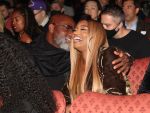CHARLOTTESVILLE, Va. (AP) — The article, titled “A rape on campus,” revolved around a student identified only as “Jackie,” who said she was raped at the Phi Kappa Psi fraternity more than two years earlier.
It described a hidden culture of sexual violence fueled by binge drinking at the college.
Police found evidence of neither.
Announcing the results of a four-month investigation, Charlottesville Police Chief Timothy Longo said Monday there were numerous discrepancies between the Rolling Stone article, published in November 2014, and what investigators found.
The police investigation’s conclusions brought a small measure of relief to students, many of whom told The Associated Press on Monday they want to put the allegations, and the torrent of negative publicity they have brought to the campus, behind them.
But the investigation is far from the final word on how U.Va. handles sexual-assault allegations.
The highly regarded public university is still awaiting a review by an independent counsel, as well as scrutiny from the Southern Association of Colleges and Schools and the U.S. Department of Education’s Office for Civil Rights.
And a state task force on campus sexual violence is expected to report its findings in a few weeks.
“This issue will not, and should not, be pushed back into the shadows,” said task force chairman and Virginia Attorney General Mark Herring.
Accurate or not, the Rolling Stone article heightened scrutiny of campus sexual assaults amid a campaign by President Barack Obama to end them. The University of Virginia had already been on the Department of Education’s list of 55 colleges under investigation for their handling of sex assault violations.
In announcing the results of the police investigation, Longo took pains to not accuse Jackie of lying, and said the case is suspended, not closed.
The fact that investigators could not find solid evidence “doesn’t mean that something terrible didn’t happen to Jackie,” he said. “There’s a difference between a false allegation and something that happened that may have been different than what was described in that article.”
Longo appealed for anyone with information about any sexual violence to immediately alert police and expressed hope that Jackie may one day feel comfortable explaining what really happened.
Asked if Jackie would be charged with making a false report, he said: “Absolutely not.”
Jackie’s attorney, Palma Pustilnik, said she would have no comment on the investigation.
Almost immediately after the Rolling Stone article was published, other news organizations found discrepancies in Jackie’s story that eventually led the magazine to print an apology.
The magazine eventually asked the dean of the Columbia University Graduate School of Journalism to review its editorial process and the piece by its contributing editor, Sabrina Rubin Erdely. The magazine said Monday that the review’s results are “imminent” and would be published in a couple of weeks.
Longo said Jackie’s first mention of an alleged assault came without key details, during a meeting she had with a dean about an academic issue in May 2013. The dean brought in police, but the case was dropped because Jackie didn’t want them to investigate, Longo said.
In any case, the “sexual act” she described that year was “not consistent with what was described” in the Rolling Stone article, he said.
University of Virginia President Teresa Sullivan asked police to investigate, and they called Jackie in for another interview. She showed up with a lawyer and again refused to talk.
Investigators spoke to about 70 people, including friends of the accuser and fraternity members, and spent hundreds of hours on the investigation, Longo said. None provided any evidence supporting the claim of a gang rape at the Phi Kappa Psi house. They gathered ample evidence casting doubt on Jackie’s claims, he said.
The article described Jackie’s recollection of a date she had on Sept. 28, 2012, with a classmate, who she said lured her upstairs at his fraternity house, where she was raped by seven fraternity brothers and thrown through a glass table. Distraught and bleeding, Jackie told three friends that night about the assault, and two of them urged her to stay silent to avoid becoming a social outcast, the article said.
In interviews with the AP, however, the same friends said the opposite was true: They said they insisted Jackie contact police, but she refused. The friends said the article didn’t match what Jackie had told them that night, and that she didn’t appear physically injured at the time.
Erdely’s article also accused campus authorities of covering up sex assault allegations to protect the university’s image.
Sullivan, thanking police Monday, said this was never true.
“The investigation confirms what federal privacy law prohibited the University from sharing last fall: that the university provided support and care to a student in need, including assistance in reporting potential criminal conduct to law enforcement,” her statement said.
Despite questions about the article, Sullivan took a number of actions, including a temporary ban on Greek social events. Fraternities later agreed to ban kegs, hire security workers and keep at least three fraternity members sober at each event.
The fraternity called the article defamatory and said it was exploring its legal options.
“These false accusations have been extremely damaging to our entire organization, but we can only begin to imagine the setback this must have dealt to survivors of sexual assault,” said Stephen Scipione, president of the Virginia Alpha Chapter of Phi Kappa Psi.
“We hope that Rolling Stone’s actions do not discourage any survivors from coming forward to seek the justice they deserve.”
Like BlackAmericaWeb.com on Facebook. Follow us on Twitter.
(Photo Source: AP)















